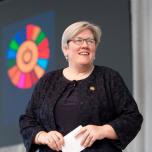Africa’s bright prospects for 2018
In the latest issue of The Beam Magazine, Rachel Kyte, CEO and Special Representative of the UN Secretary-General for Sustainable Energy for All, writes about Africa’s bright prospects for making significant energy access gains in 2018.
In recent years, as the world has focused on the message from African leaders in government, business and civil society that Africa is rising, the price of grid connected renewable energy has plummeted. At the same time, business models for using decentralised renewable technologies have taken off. Add to that financial pledges to help countries close energy access gaps and meet their contributions under the Paris Climate Agreement, it would seem the time is ripe to turn sustainable development goals into reality.
As we start 2018, there is good news and bad news. First, the bad news. There is a lot to do. An estimated 600 million Africans do not have access to electricity that would allow them to be productive contributors to the economy. Roughly the same number of Africans also lack access to clean cooking fuels. The good news is that the solutions are not beyond our reach; we simply need technology, policy and finance to work together. Everywhere I travel, I see examples of policy reforms that are working, investments happening and partnerships coming together. The challenge of 2018 is speed and scale.
So, to start the year, here are a few steps that can help African countries move even faster toward a sustainable energy future for all.
- Embrace integration. Government leaders in Africa have a golden opportunity to re-think their national electrification plans. Embracing integrated electrification strategies, using both centralised and decentralised energy sources, with more renewables in the mix, will allow for a speedier and cheaper pathway to close energy access gaps, especially in remote rural areas where the grid is and always will be a distant prospect.
- Embrace the moment. Across the world, we are seeing low auction prices for renewables at auction. The IFC-backed Scaling Solar program has helped Zambia secure solar at 6 cents per kilowatt hour, the lowest solar price to date in Africa. There is much to learn from other regions, too. Chile, Argentina and India are successfully positioning themselves to exploit renewables. They put in place strong regulations, with transparent power purchase agreements (PPAs). They are rewarded with competitive prices and solid long-term investors.
- No more harmful subsidies. It’s complicated, but it’s time to stop subsidising dirty energy for poor people. Subsidise clean energy services for the poorest. Following in the footsteps of many other countries, there are benefits to moving more quickly to remove fossil fuel subsidies and put in place systems that support those on low incomes to access clean cooking fuels and electricity. Countries that have done this or have experimented with it, from Morocco to Malawi, from Indonesia to Mexico to Angola, can be sources of inspiration and confidence.
- Lay the table. Our recent RISE report showed that African countries lagged behind their Asian peers in having supportive policy environments for more renewables, energy efficiency and greater energy access. Improving these policy frameworks, as well as ensuring that investment climates are solid and stable, is essential.
The evidence is clear that leaders that act boldly will be rewarded. There are many companies, large and small, seeking to enter what should be a vibrant market to provide affordable, reliable and clean energy services to millions in Africa that don’t have them today. Today, as our work on Energizing Finance shows, little of the financing being pledged is reaching underserved populations with no electricity at all. Donors, the international community and multilateral banks need to move more quickly to make their funding available at the right price, in the right form and at the right time. Recent upticks in interest from philanthropy and impact investors to invest in clean energy access solutions can be exploited, too, but there will need to be more aggregators and more support to new market entrants to make it through early-stage finance difficulties known as the “valleys of death.”
The Beam is shining a light on the stories we need to know to move us ever closer to achieving the Sustainable Development Goal of universal access to sustainable energy for all by 2030. We need this kind of journalism more than ever. Africa is rising indeed, but it cannot rise in the dark.
Photo credit: Annie Spratt



